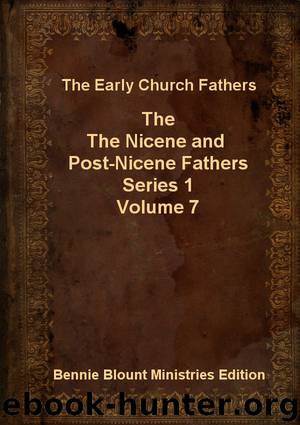Nicene and Post-Nicene Fathers Series 1 Volume 7 by Early Church Fathers

Author:Early Church Fathers [Fathers, Early Church]
Language: eng
Format: epub
Tags: Early Church Fathers
Publisher: Bennie Blount Ministries
Published: 0101-01-01T00:00:00+00:00
Tractate LI.
John XII. 12-26.
1. After our Lord's raising of one to life, who had been four days dead, to the utter amazement of the Jews, some of whom believed on seeing it, and others perished in their envy, because of that sweet savor which is unto life to some, and to others unto death;1 after He had sat down to meat with Lazarus-the one who had been dead and raised to life-reclining also at table, and after the pouring on His feet of the ointment which had filled the house with its odor; and after the Jews also had shown their own spiritual abandonment in conceiving the useless cruelty and the monstrously foolish and insane guilt of slaying Lazarus;-of all which we have spoken as we could, by the grace of the Lord, in previous discourses: let your Charity now notice how abundant before our Lord's passion was the fruit that appeared of His preaching, and how large was the flock of lost sheep of the house of Israel which had heard the Shepherd's voice.
2. For the Gospel, the reading of which yon have just been listening to, says: "On the next day much people that were come to the feast, when they heard that Jesus was coming to Jerusalem, took branches of palm trees and went forth to meet Him, and cried, Hosanna: blessed is He that cometh in the name of the Lord as the King of Israel." The branches of palm trees are laudatory emblems, significant of victory, because the Lord was about to overcome death by dying, and by the trophy of His cross to triumph over the devil, the prince of death. The exclamation used by the worshipping2 people is Hosanna, indicating, as some who know the Hebrew language affirm, rather a state of mind than having any positive significance;3 just as in our own tongue4 we have what are called interjections, as when in our grief we say, Alas! or in our joy, Ha! or in our admiration, O how fine! where O! expresses only the feeling of the admirer. Of the same class must we believe this word to be, as it has failed to find an interpretation both in Greek and Latin, like that other, "Whosoever shall say to his brother, Raca."5 For this also is allowed to be an interjection, expressive of angry feelings.
3. But when it is said, "Blessed is He that cometh in the name of the Lord, [as] the King of Israel," by "in the name of the Lord" we are rather to understand "in the name of God the Father," although it might also be understood as in His own name, inasmuch as He is also Himself the Lord. As we find Scripture also saying in another place, "The Lord rained [upon Sodom fire] from the Lord."6 But His own words are a better guide to our understanding, when He saith, "I am come in my Father's name, and ye receive me not: another will come in his own name, and him ye will receive.
Download
This site does not store any files on its server. We only index and link to content provided by other sites. Please contact the content providers to delete copyright contents if any and email us, we'll remove relevant links or contents immediately.
The Gnostic Gospels by Pagels Elaine(2527)
Jesus by Paul Johnson(2352)
Devil, The by Almond Philip C(2324)
The Nativity by Geza Vermes(2226)
The Psychedelic Gospels: The Secret History of Hallucinogens in Christianity by Jerry B. Brown(2148)
Forensics by Val McDermid(2087)
Going Clear: Scientology, Hollywood, and the Prison of Belief by Lawrence Wright(1975)
Going Clear by Lawrence Wright(1962)
Barking to the Choir by Gregory Boyle(1819)
Old Testament History by John H. Sailhamer(1809)
Augustine: Conversions to Confessions by Robin Lane Fox(1769)
The Early Centuries - Byzantium 01 by John Julius Norwich(1736)
A History of the Franks by Gregory of Tours(1717)
A Prophet with Honor by William C. Martin(1717)
Dark Mysteries of the Vatican by H. Paul Jeffers(1704)
The Bible Doesn't Say That by Dr. Joel M. Hoffman(1676)
by Christianity & Islam(1627)
The First Crusade by Thomas Asbridge(1601)
The Amish by Steven M. Nolt(1562)
